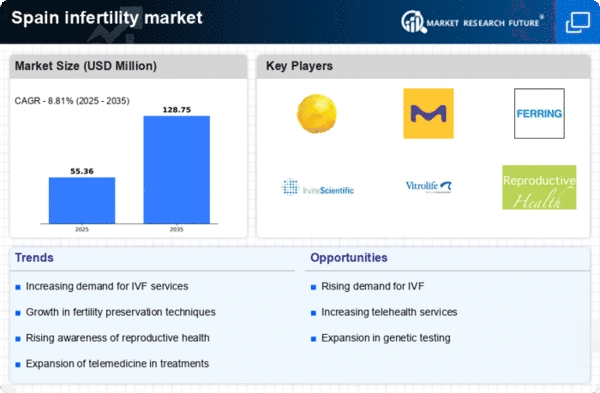Rising Infertility Rates
The infertility market in Spain is experiencing growth due to rising infertility rates among couples. Recent data indicates that approximately 15% of couples in Spain face difficulties in conceiving, which has led to an increased demand for fertility treatments. This trend is further exacerbated by lifestyle factors such as delayed childbearing, obesity, and environmental influences. As more individuals seek assistance, the infertility market is likely to expand, with a projected growth rate of around 8% annually. This rising prevalence of infertility is prompting healthcare providers to enhance their offerings, thereby driving innovation and investment in the sector.
Government Funding and Support
Government initiatives play a crucial role in shaping the infertility market in Spain. Increased funding for fertility treatments and research has made these services more accessible to a broader population. In recent years, the Spanish government has allocated approximately €100 million annually to support fertility programs, which has resulted in a rise in the number of treatments covered by public health insurance. This financial support encourages couples to seek help earlier, thereby increasing the overall demand for infertility services. As public awareness of available resources grows, the market is likely to see continued expansion.
Cultural Shifts Towards Family Planning
Cultural attitudes towards family planning are evolving in Spain, influencing the infertility market. There is a growing acceptance of assisted reproductive technologies as viable options for family building. This shift is partly driven by changing societal norms, where individuals prioritize career and personal development before starting families. As a result, couples are increasingly turning to fertility treatments when faced with challenges in conception. This cultural transformation is expected to sustain the growth of the infertility market, as more individuals recognize the importance of seeking help and the options available to them.
Advancements in Reproductive Technologies
Technological innovations are significantly impacting the infertility market in Spain. The introduction of advanced reproductive technologies, such as in vitro fertilization (IVF) and preimplantation genetic testing (PGT), has revolutionized treatment options. In 2025, the IVF success rate in Spain is reported to be around 40%, which is encouraging for couples seeking assistance. These advancements not only improve success rates but also enhance patient experiences, leading to increased adoption of these technologies. As clinics invest in state-of-the-art equipment and training, the infertility market is poised for substantial growth, with an expected increase in service offerings.
Increased Collaboration Among Healthcare Providers
Collaboration among healthcare providers is enhancing the infertility market in Spain. Fertility clinics, gynecologists, and general practitioners are increasingly working together to provide comprehensive care for patients. This integrated approach ensures that couples receive timely referrals and access to a range of treatment options. In 2025, it is estimated that around 30% of fertility clinics in Spain are part of collaborative networks, which improves patient outcomes and satisfaction. As these partnerships continue to develop, the infertility market is likely to benefit from improved service delivery and a more streamlined patient experience.
















